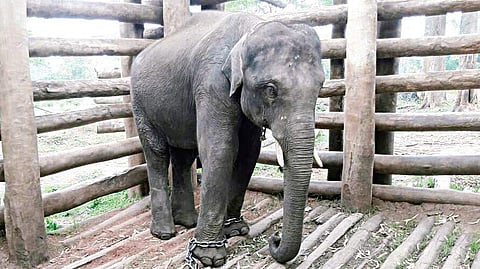

NEW DELHI: Contrary to the recommendation of the Elephant task force 2010, the Ministry of Environment, Forest and Climate Change notified the rules for transportation and transfer of the captive elephant.
The elephant task force in its 2010 report recommended gradual phasing out of private ownership of elephants by addressing legal loopholes. However, the MoEFCC in its 2022 amendment to the Wildlife (Protection) Act of 1972 introduced exemptions for transfer of captive elephants for 'religious and other purposes.
“Such amendment becomes a potential for misuse, particularly for trade of elephants in the disguise of transfer,” said Debadityo Sinha, a wildlife legal expert. He further questioned the intent of the government with this rule.
“Such activities contradict both the intent of the Wildlife (Protection) Act and the recommendations put forth by the MoEFCC's Task Force,” he added.
According to the notification, the transportation of captive elephants is allowed only if the owner is no longer able to maintain the elephant or if he thinks his elephant will have a better upkeep than present circumstances.
According to rules, owners should file an application to his area’s Deputy Conservator of Forests (DCF) where his elephant is registered. The concerned official will examine in detail the housed and also proposed shifting facility and get a health certificate of the elephant from a veterinary practitioner.
After that DCF will prepare a report and forward the application to state’s Chief WildLife Warden (CWLW). The rules authorize the CWLW to examine the report and take a call of accepting or rejecting the application.
In case of transferring it to outside states, the doner state’s CWLW will forward the application with a report to recipient state’s CWLW. The recipient state official will examine in detail the donors as well as the recipient facility and take calls on the proposed elephants.
The rules set conditions for transportation of the elephant within three months of the date of grant of permission. It says the elephant shall be accompanied by a mahout and an elephant assistant, a health certificate from a veterinary practitioner to the effect that the elephant is fit for transport and is not showing any sign of musth or infectious or contagious disease.
It also states that the transport shall be carried out after the mandatory quarantine period as advised by the veterinary practitioner is over, in case of contagious disease. Besides, the donor elephant should be properly fed and given water before loading and necessary arrangement during transportation.
It also allowed use of tranquilizers/sedatives to control nervous or temperamental elephants upon prescription by the veterinary practitioner.
“No transfer of an elephant is permissible unless its genetic profile is entered in the electronic monitoring application of the ministry," the notification said.